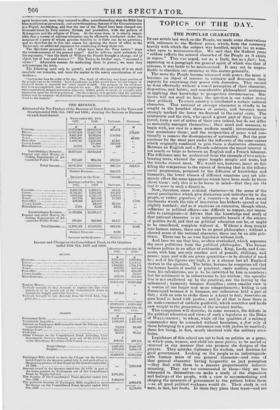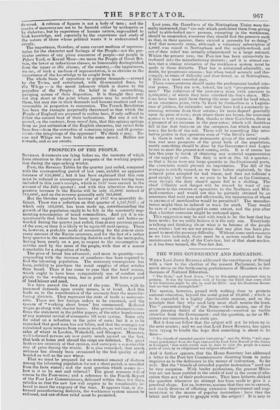TOPICS OF THE DAY.
THE POPULAR CHARACTER.
IN our article last week on the People, we made some observations with reference to the Radical press, which, from the necessary brevity with which the subject was handled, might lay us some- what open to misconstruction. We said that the Radical press " seldom reflects the natural character of the People as it exists in repose." This was urged, not as a fault, but as a fact ; but, appearing in a paragraph the general spirit of which was that of censure, it was liable to be misconceived. It may not be unpro- fitable to elucidate our meaning in this matter generally.
The more the People become intrusted with power. the more it
becomes an object of interest to estimate and determine their capacity for exercising that power with discretion. This cannot be done effectually without a sound perception of their character, disposition, and habits, and considerable philosophical acuteness in applying that knowledge to prospective circumstances. Sta- tistics will not avail us here; the question is one rather moral than political. To every country is attributed a certain national character. This national or avPrage character is chiefly to be sought in the humbler classes ot society, and becomes more strongly marked the lower we descend in the social scale. The aristocratic and the rich, who speiid a great part of their lives in travel, form a sort of nation of their own indeed, but do not differ so materially amongst themselves : their mind and manners, to begin with, are cast in a more uniform mould; intercommunica- tion assimilates them ; and the reciprocities of peace tend con- tinually to remove the discrepancies of nationality. But the poor continue for the most part under the influence of the same causes which originally combined to give them a distinctive character. Between an English and a French nobleman the moral interval is not nearly so large as between an English and a French labourer. The difference may be understood from the example of two neigh- bouring trees, whereof the upper boughs mingle and unite, but the trunks cannot meet. We would not, however, insist on ful- filling the comparison to the extent of denying that in the infinite social progression, promised by the diffusion of knowledge and humanity, the lower classes of different countries way not ulti- mately effect the same approaches which have been made by those above them : only this is to be borne in mind-that they are the last to move in such a direction.
Now, therefore, since national character-in the sense of the moral peculiarities which give distinction and individuality to the people, or rather populace, of a country-is one of those social landmarks which the tide of innovation has hitherto spared or but slightly touched; and as it exercises an extensive, though silent, influence in political affairs-one difficult to temper, and impos- sible to extinguish-it follows that the knowledge and study of that national character is an indispensable branch of the science of politics itself, and that no political education can be, or ought to be considered, complete without it. Without a deep insight into human nature, there can be no great philosopher ; without a shrewd sense of the national character, there can be no able poli- tician. There can be no wise legislator without both.
And here we see that line, so often overlooked, which separates the mere politician from the political philosopher. The former reduces politics to an affair of arithmetic ; King, Lords, and Com- mons, with him are only another sort of pounds, shillings, and pence; man and wife are given quantities-to be divided if need be ; aid if his figures run high, it is a chance but all England starves in the quotient. The latter, because he comprises all that the former boasts of useful or practical, omits nothing essential from his calculations, nor is to be outwitted by him in numbers; but his arithmetic is in subservience to his wisdom ; the specula- tive is not swallowed up by the practical, nor the lasting by the ephemeral ; humanity tempers discipline ; every smaller view is a section of one larger and more comprehensive; feeling is not discouraged because it is humane, nor induration held a part of duty ; with an arm to strike there is a heart to feel; benevolerxe goes hand in hand with justice; and in all that is done there is an under-current of' catholic good-will, which sanctifies and lends new weight to the prosecution of the severest truths. This comparison will describe, in some measure, the defects in the political education and views of such a legislator as the Duke of WELLINGTON; to whom, while all the qualities of a military commander may be conceded without hesitation, a few only of those belonging to a great statesman can with justice be ascribed; these few being, in fact, nearly identical with the military attri- butes.
Legislators of this school are apt to look on politics as a game, in which man, woman, and child are were pieces, to be moved or removed in any manner that can promote the designs of the players. They mistake diplomacy for wisdom, and doctrine for good government. Looking on the people as an indistinguish- able human mass of one general character-and evenof that general character having frequently no just perception -they deal with them in a manner proportionably indiscri- minating. They are too uninterested in them-they are too interested in themselves-to make a study of the disposition and feelings of the people, with a view to accommodating and shaping the measures of government to the pattern before them
i
-as all good political workmen would do. Their study s not men, in fact, but books. Ih them they place their trust-and are
de7eived. A column of figures is not a body of men ; and the results of measures are not to be foretold either by arithmetic or by dialectics, but by experience of human nature, superadded to book knowledge, and especially by the experience and study of • the nature of those whose political wants it is endeavoured to so pply.
The importance, therefore, of some correct medium of represen- tation for the character and feelings of the People—not the par- ticular animus of any given concourse of people—not people in Palace Yard, or Kersal Moor—we mean the People of Great Bri- tain, the lower or industrious classes, as honourably distinguished from the upper or idle classes, of the country,—the importance, we say, of such a medium of representation, is as obvious as the importance of the knowledge to be sought from it. The whole basis of opposition to popular demands —avowed by the Toiies, and entertained, with ill-concealed fears, by the Whigs — is the moral inference which is drawn to the prejudice of the People ; the belief in the encroaching, grasping nature of their disposition. It is thought they may not stop short at the point where justice may be rendered to them, but may rise in their demands and become insolent and un- reasonable in proportion to concession. The French Revolution has been the example perpetually threatened as that which the People of England are prepared to realize here, if only suffered to follow the natural bent of their inclinations. But can it not be proved, on the contrary, from moral data, that this opinion springs from no just estimatioe of the English character, hut rather from base fear—from the cowardice of conscious injury and ill govern- ment—the misgivings of the oppressor? We think it may. To- lies and Whigs are here both in the same moral. Bullies are cowards, and so are sneaks.



























 Previous page
Previous page